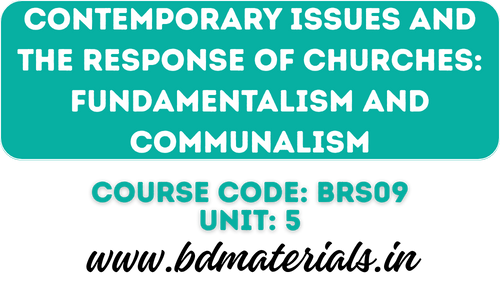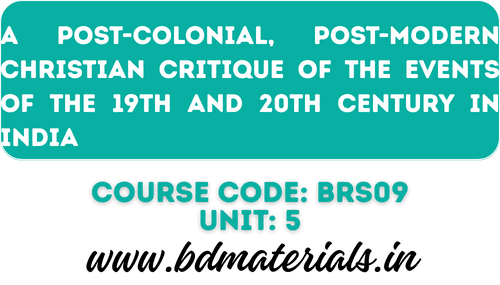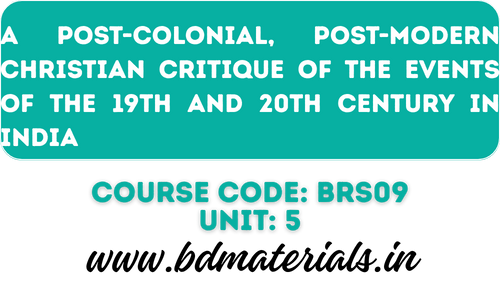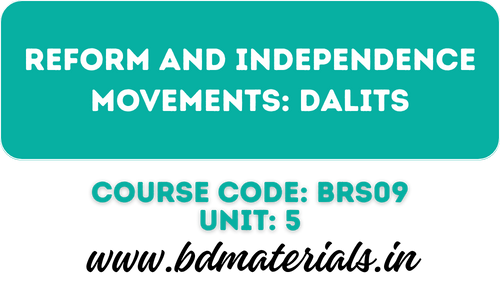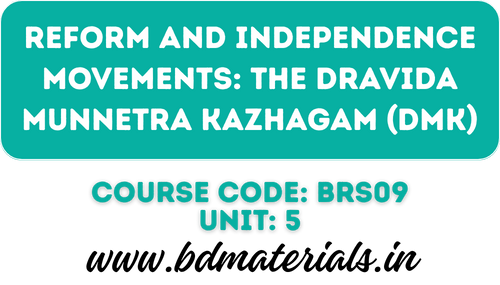Fundamentalism and Communalism
Fundamentalism:
The dictionary defines the word fundamentalism as ‗a form of Protestant Christianity which promotes the belief that the Bible is literally true’ and in a broader sense, it says that fundamentalism refers to ‗the strict following of the fundamental doctrines of any religion or system of thought’. According to Sr. Stella Baltazar, “Fundamentalism implies a belief held by a group of people who have the power and the facility to impose, project their beliefs on others and control them with an ulterior personal motive which negates and denies access to such facilities and information to a section of people in its own circle or outside of it. When a group uses the name of God in doing this, it becomes Religious Fundamentalism.
Historical origins: When we look at the historical origin of this term, we find that, the term Fundamentalism originated from the sphere of the Protestant Christians in U.S.A. in the year between 1909 and 1915 with a series of pamphlets called ‘The Fundamentals: A testimony to the Truth’ which attacked modernist or liberal views of the Bible and defending fundamental doctrines. Thus, we can say that ‘Fundamentalism’ refers to the movement of the conservatives against the liberals in order to uphold and preserve the original principles of a religious faith. It also implies returning to the basic teachings of any religion. Even though the term ‘Fundamentalism’ was first used as a deliberate reaction to liberalism, it has come to have a pejorative connotation in the minds of the common people.
Fundamentalism now has a bad and derogatory connotation because; it has come to designate one’s own position as the only valid position. It rears a false consciousness among members of a particular group placing emphasis on the most minor and marginal details of a tradition, often forgetting the dynamic orientation of faith to the ultimate meaning of human life. Therefore, in popular usage, the term ‘fundamentalism’ has come to mean the narrow-minded claim that one’s faith is the sole truth while opposing others’ belief, faith or opinion. Moreover, ‘religious fundamentalists’ have come to be seen as the people who are terrorizing and causing immense trouble to their fellow human beings in the name of religion.
When fundamentalism first came into prominence, it meant returning to the basic tenets of the Bible, or to return to the fundamentals or foundation of one’s own faith. But today, it has come to mean much more than that with mostly a negative implication. So, for Vincent Shekhar, religious fundamentalism is “a threat posed by ideologies and movements that its feelings and structures are often manipulates by political, economic, cultural or ethnic power groups in order to safeguard their vested interests.”
Religious Fundamentalism has so many characteristics. Paul Puthanganady has listed out four main characteristics of religious fundamentalism as follows:
- It rejects change in the expressions of religious faith in social structure.
- It tends to isolate itself from the influence of other religions, ideologies, etc.
- It develops an attitude of self-righteousness in people who claim to be the defenders of their faith.
- It considers proselytism as an integral part of its religiosity.
Therefore, we can say that, religious fundamentalism is a prejudiced affirmation of the truth of one’s own beliefs. It is the firm conviction that one’s belief is the sole truth and the desire to impose this belief on others through violent means or any other method applicable, giving scant importance or respect to the opinion of others.
Communalism:
Communalism is a term with three distinct meanings according to the Random House Unabridged Dictionary. These include: (1) a theory of government or a system of government in which independent communes participate in a federation; (2) the principles and practice of communal ownership. (3) The third definition is “strong allegiance to one’s own ethnic group rather than to society.” In the Indian subcontinent, the term communalism has taken on a very different meaning, namely that of a religion—and, more specifically, ethnicity-based sectarianism promoting communal violence, taken up by many political movements.
James Massey also sees a direct link between ‘communalism’, ‘religion’ and ‘politics’. The Western concept of communalism includes a deep social commitment of a commune or community. In that context it is almost used in the sense of ‘communion’, ‘collectiveness’, ‘socialism’ and ‘co-operation’.
Rasheeduddin Khan, Communalism is “…perversion of a religion from a moral order to a temporal arrangement of contemporary convenience…from a strategy of living into tactics of politics…communalism seeks to conform arbitrary religious tenets, tradition and values of suit exigencies of current political life and tactical interest. Communalism thus is exploitation, naked and subtle, of religion and of genuine attachment to a religious community. Likewise, Asghar Ali Engineer says that, communalism in India “has been the art of realizing secular ends through religious means, by the elites of both the communities. Here both communities would refer to the Hindus and the Muslims.
However, while understanding the use of religion in communal politics we should note that religion is neither the cause nor the end of communalism, but only its vehicle. Religion is made to serve politics as a garb or rationalization. Religion plays an extraneous role or a role of a mask because we find communalists to be both non-practicing religionists and those not interested in theology. Religion is an instrument rather than a causative factor of communalism. Religion, on account of its powerful emotional appeal, has often sought to be dragged into political and social arenas by various interest-groups.
Thus, we can say that communalism is not religion. But this proposition is not entirely true as communal feeling is fed by ‘religious sentiments’. When religious sentiment of a community is stimulated to an ‘end’ and when the ‘end’ is something other than religious, the society finds itself trapped in the communal net. Hence, when religion is politicized for political, economic or other ends, communalism emerges.
Response of the Churches in countering Religious Fundamentalism and Communalism:
We speak and hear of Hindu fundamentalism, Islamic fundamentalism, Christian fundamentalism, Hindu-Muslim communal riots etc. very often. In such a context, what would be the response of the Churches? What could be the measures that can be taken to counter religious fundamentalism and religious communalism?
Certain measures for countering religious fundamentalism and communalism which has undoubtedly affected the process of socio-economic growth of the country may be mentioned.
a) Preach the Good News of Christianity and not the bad news of other religions:
During the British rule of India, Christianity was seen as the dominant ideology of the colonialists, whose technology and military prowess were unmistakable. English was understood as the language of Christianity by the majority of Indians. Moreover, Christian missionaries had the tendency to publicly insist on the obvious superiority of all things Christian compared to the heathen idolatry and debauchery of all things Hindu.
Therefore, as asserted by Cherian, this superiority attitude of the Christian missionaries forced the educated and the enlightened Hindus to re-examine and defend their own religion. As a result, there emerged numerous reforming agencies, some of which worked for the regeneration of Hinduism, while some gave a more traditional defense of their faith by claiming superiority for their religion. The outcome was the eventual emergence of fundamentalist tendencies. As put by Dr. Roger Gaikwad, “Quite often evangelists are guilty of preaching, what they interpret as, the bad news of other religions rather than giving expression to the good news of Jesus Christ. This is true not only for the Christian faith; people of other faiths have also employed exclusivist theologies and strategies in propagating their own particular faiths and beliefs.
Therefore, in a pluralistic context of ethnicity and faiths, it is the duty and responsibility of every Christian and the Church in general to preach the good news of Christianity which is concerned with peace and justice, holistic salvation, love and equality. The Church and every Christian should do away with the exclusivistic mindset, intolerance for people of other faiths or ethnicity and any form of biased attitude.
b) Know your neighbour:
What we do not know, we fear. We fear death because we are not sure what lies beyond. We are afraid of the dark because we cannot see what lies ahead of us. Many conflicts arise due to our limited knowledge about the people of different faith or ethnicity living near us. Therefore, the Church and Christians living as a group in society must have a good idea about the people with whom they share society and the faith that they profess. The Church must make efforts to be in personal touch with friends professing a different faith or culture. Christians must remember that they are people like us, with their joys and sorrows, their burdens and anxieties, their fears and hopes, their failures and their sins.
As Max Muller so emphatically stated “He who knows one, knows none,” Christians should strive to know the customs and beliefs of the people of other faiths in order to effectively witness the Gospel. Moreover, it would be good to be well acquainted with their history, doctrines and practices. Only when the Church and Christians knows the people with whom they share society well will they be able to present the Christian truth in a comprehensible and attractive manner and be able to avoid misunderstandings and misinterpretation.
The Church’s understanding of other faiths has usually been influenced by Western interpretation and analyses. Therefore, it is necessary to study other religions as it is believed and practiced in the context of the practitioners. In the same way, the perception of Christians by people of other faiths is also tinted by the history of conflicts and misunderstandings. Therefore, there is the need for mutual correction and self-evaluation of each other’s faith in order to eradicate unnecessary prejudices.
c) Realize the image of God in each and every person:
William Gurnall said, “We are afraid of human beings because we do not fear the Lord.” How true! Since we lack true fear of the Lord we are unable to realize and see the image of God in our fellow human beings and thereby we lack love for one another, respect for one another. Human beings are made in God’s image and in His very likeness (Gen. 1:27). If we could see God’s image in every person, there would be no room for hatred. Therefore, each and every person, whatever be his/her ethnicity, culture or religion, is made in the image of God. If we truly fear the Lord, then we should be able to realize the image of God in our fellow human beings and see him/her in God’s likeness. The Bible says, “Let no debt remain outstanding, except the continuing debt to love one another, for he who loves his fellowman has fulfilled the law,” (Rom. 13:8). Hence, in an ethno-religious pluralistic context, it is crucial that we realize the image of God in each and every person and leave no debt outstanding, except the continuing debt to love one another, in order to maintain peace and harmony in the society.
d) Responsibility of the Church:
The Church should commit itself to proclaiming a firm conviction that violence and terrorism are incompatible with the authentic spirit of religion, and condemn every type of violence perpetrated in the name of religion. The Church has to teach the people of different faiths that the riots and brutal killings are not the answer to the problems and differences. The Church needs to work as a mediator and play an important role in the local, national and international level. It should motivate, educate and encourage the members of the congregation to actively participate in the liberation of the oppressed and the marginalized.
The evangelization of the world should not be concerned only with spiritual salvation, but to transform the world, to change the economic, socio-political, cultural and religious milieu. The Church should work for the realization of the Kingdom of God in the here and now and the inculcation of Kingdom values in the society. There is a need to work for unity among the various religious and cultural traditions through dialogue, which provides the creative challenge for introspection, growth and insight within our own faiths and traditions also.
Friendly Note
Bachelor of Divinity Materials is your go-to resource for comprehensive Biblical studies, supporting students in Bachelor of Divinity (B.D.) and other theological courses. Our platform offers access to the full syllabus, detailed answers, and a vast collection of assignments, study guides, articles, and research papers to help you excel academically.
We provide downloadable PDFs of study materials, including books and journals, for convenient learning anytime, anywhere. Whether preparing for exams or conducting research, our resources cater to both students and scholars in biblical studies.
Committed to empowering theological learners, we aim to deliver high-quality, authentic study materials. Explore Bachelor of Divinity Materials to deepen your understanding of God’s Word and Christian doctrine, making it a valuable resource for aspiring ministers and anyone dedicated to theology.
